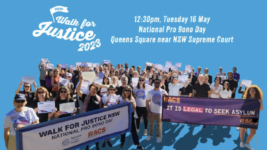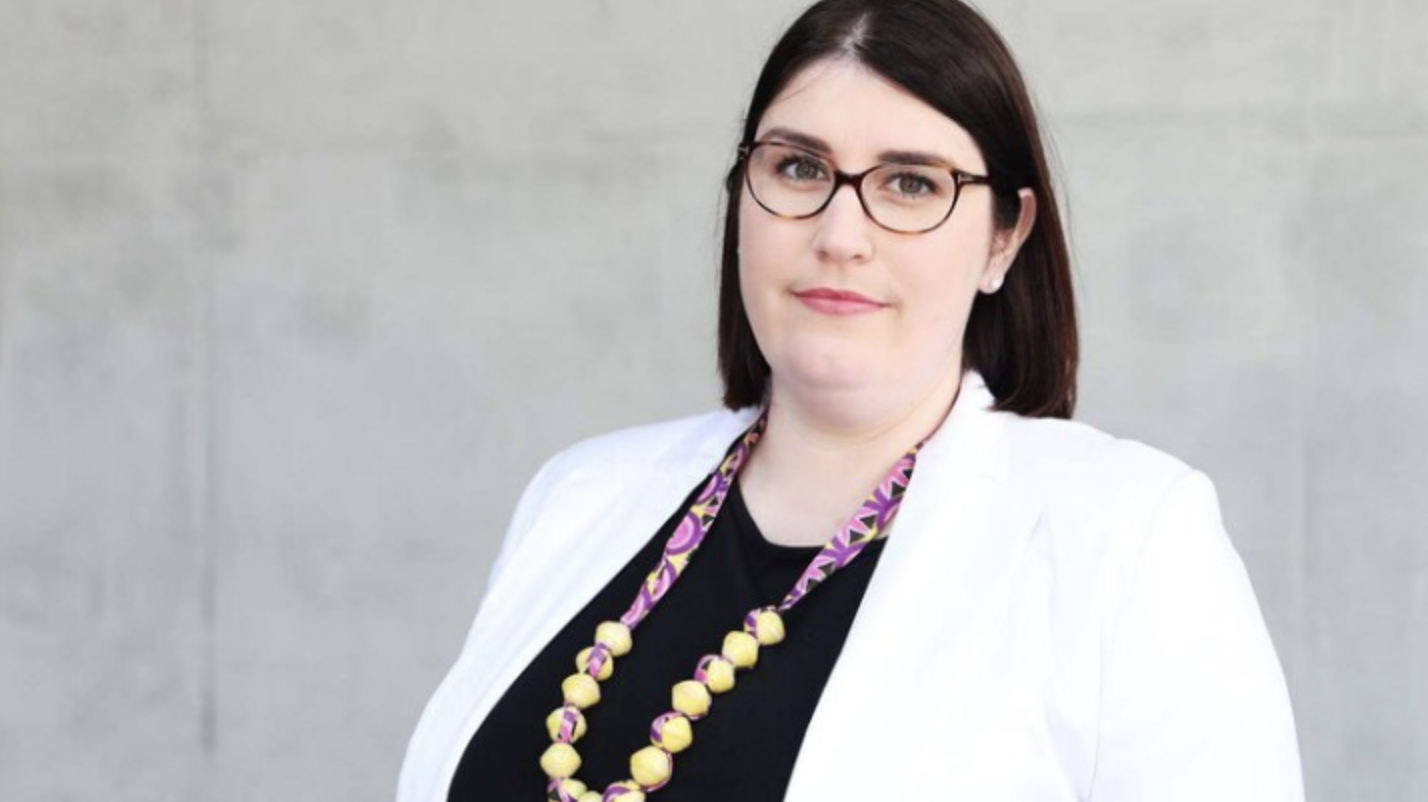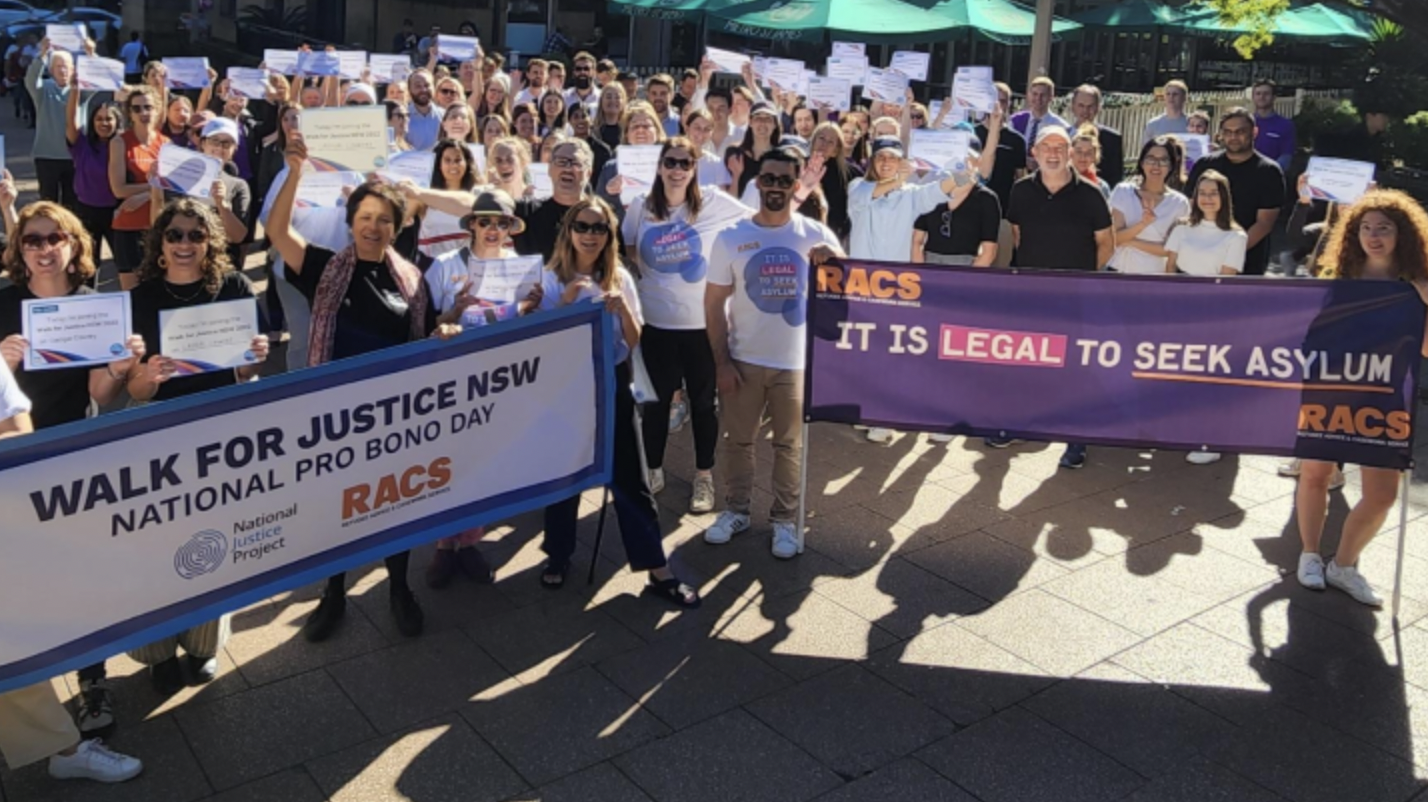Join the Walk for Justice: RACS Director Sarah Dale on the Importance of Pro Bono Work

Pro bono is taken from the Latin phrase “pro bono publico”, which means “for the public good”.
These days, pro bono legal work commonly refers to free legal services, or those provided at a significantly reduced cost, with no expectation of financial reward on the part of lawyers providing it.
Although the phrase it’s derived from has been reduced, the term pro bono legal work continues to carry the entire original meaning, in that pro bono services are provided by the legal profession “for the public good”, as it ensures that those who can’t afford it, can still access legal representation.
Indeed, much of the legal cases that make the news and might be classed as social justice issues are often taken on by lawyers working free-of-charge to step in to prevent injustice – think climate defenders, LGBTIQ activists, refugees, asylum seekers, the stateless and First Nations peoples.
And to highlight the importance of pro bono work to the wider community, the National Justice Project and the Refugee Advice and Casework Service (RACS) are hosting the Walk for Justice 2023 to raise support for the issue on 16 May, which also happens to be National Pro Bono Day.
Accountability where none would exist
The National Justice Project is known for taking on challenging cases where often authorities have perpetrated injustice against marginalised people, such as in the custody death of David Dungay Junior, the police shooting of Thomas McKenzie or in assisting First Nations kids hounded by police.
A spokesperson for the legal service told SCL that “the progress we have achieved with our clients has only been made possible thanks to the pro bono contributions of legal professionals across Australia”.
“They provide us with their advice, legal skills, tools and experience to be able to take on some of the most challenging cases,” the NJP representative explained. “Thanks to their input, we are able to launch strategic legal action, write powerful complaints and represent clients at coronial inquests.”
Just last year, the project received the Gift for Good Award at the 2022 ALTA Awards, which recognised the utilisation of legal technology in collaboration with pro bono services, after NJP had partnered with legal tech firms Law In Order and Relativity.
This resulted in such technology being used “to review more than 45,000 documents the government produced in our legal cases to establish a duty of care to refugees in offshore detention”, the NJP representative explained.
“And in addition to legal tech contributions, we have been supported by an army of volunteers to accomplish the huge task of legal discovery for these vital cases.”
Supporting those who’ve left everything
The Refugee Advice and Casework Service has tirelessly supported refugees and asylum seekers living in the community for 36 years now. And its huge caseload is made up of clients who are often barred from working and are unable to fill out the extensive forms they’re required to.
The lawyers who donate their free time in assisting people who’ve fled harm in their countries of origin are essential not only in assisting clients without money or fluent English, but also in navigating the ever-changing patchwork of Australian migration law.
Sydney Criminal Lawyers spoke with RACS centre director and principal solicitor Sarah Dale about why pro bono services play such an important role, the recent move by the Albanese government to extend permanent protection to 19,000 refugees and why we should all join in walking for justice.

NJP and the RACS are staging the Walk for Justice NSW 2023 at 12.30 pm on Tuesday 16 May. This is an event that celebrates the positive impact that pro bono legal work provides the community.
Sarah, broadly speaking, how does pro bono work make for a better community? What would society lack without these free-of-charge services?
RACS could not support the community it does without pro bono support. We are only able to reach the sheer number of people that turn to us because our pro bono partners stand alongside us to address the need.
For the people we support, that means they don’t have to face important life changing interviews alone. It means they know someone can support them when having to attend tribunal hearings.
And it means they can understand and prepare critical forms, and the like, that could be the difference between finding safety in Australia and fearing danger in their home country.
Pro bono work is an established aspect of the legal profession, which involves individuals and firms forgoing their usual financial reward for services rendered.
So, why would you say it should be incumbent on the legal profession and legal professionals to perform such tasks without pay?
Lawyers, fundamentally, stand to uphold the rule of law, which can only be ensured when all have access to justice.
By providing pro bono assistance and ensuring free and equal access to our justice systems, it protects the very fundamentals of why we all choose to be lawyers in the first place.
RACS provides free legal services to financially disadvantaged and vulnerable people seeking asylum in Australia. And while your organisation employs key staff, much of the work is carried out by legal professionals working pro bono.
Can you talk about how your organisation considers your volunteer legal staff, and what they add to RACS?
RACS is a relatively small staff team, however one which saw us support around 4,000 people. We were able to address this need with the support of more than 25,000 volunteer hours last year.
This is a combination of hours delivered by our law student volunteers, practical legal trainees and through pro bono programs at partner firms.
These volunteers provide our frontline services. They are the first voices of support heard by our community, triaging all our requests for assistance, and ensuring people get the help they are needing.
Our firm partners really ensure we can meet the need of the masses. When Kabul fell to the Taliban in August 2021, we had hundreds and hundreds of requests for our assistance, and our team alone was never going to be able to get through the sheer volume.
But through training pro bono lawyers and supervision by the RACS team, we were able to address each of these calls by having more and more lawyers available to answer questions and prepare forms, in a timely way, when it was most critical for our community.
The Albanese government made good on its election promise to abolish temporary visas for refugees living in the community with permanent protection in February.
However, it did this in relation to only 19,000 of these individuals, leaving a further 12,000 in legal limbo.
What was the reaction of RACS to this development? And how has it affected your workload?
RACS is elated by the news that 19,000 people now have a clear pathway to the permanency that so many have longed for, for over a decade.
Whilst there is still work to do, and extensive work will flow from this, such as family reunification and citizenship efforts, we are excited our community now have the dignity of certainty.
Of course, we would have liked to have seen this extended to many more in our community, and we stand with them in their disappointment in not being afforded this direct pathway to permanency.
However, it is for this reason RACS exists.
RACS will continue to support people navigating the legal system, to advocate for their need to be recognised as needing protection in Australia and, hopefully, also realise the safety and permanency they need.
The unfortunate current reality is those not included will need to continue to engage in the legal process available to them, and our team stands ready to assist with this.

And lastly, Sarah, the 2023 Walk for Justice is being held on 16 May, which coincides National Pro Bono Day.
So, in raising awareness to the importance that pro bono legal work plays in the community, what further messages are you conveying in terms of how these services are operating?
RACS only exists and delivers the services it does due to community support. This support exists in donations and philanthropy, advocacy and awareness – and pro bono and volunteer support.
Our community is stronger for standing together, and RACS is a key example of the difference that can be made, particularly for some of the world’s most vulnerable, when we do.
At RACS, we are grateful for the many that stand with us, so that we can stand in solidarity for and with refugees to be afforded the justice and dignity they so deserve.







